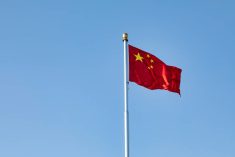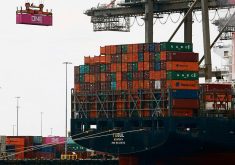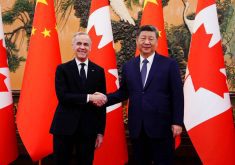The day after Donald Trump’s election to his second term as U.S. president, Canadian farm and food leaders are considering how this could shift trade priorities for Canadian agri-food.
Trump’s pledges to boost competitiveness for American farmers could put Canadian farmers at a disadvantage and intensify the pressures on the Canadian ag sector, said Sylvain Charlebois, Director of the Dalhousie University Agri-Food Analytics Lab said in an emailed news release.
“Canada must confront a transactional approach from a Trump-led U.S., one that may bring both predictability and hard-nosed negotiations,” he wrote.
Read Also

Pea, lentil outlooks have some positive signals – Penner
As pulse growers consider what to plant this spring, Chuck Penner of Leftfield Commodities Research said there is some optimism in the Canadian pulse market. Penner gave a presentation at the Saskatchewan Pulse Growers meeting in Swift Current on Feb. 4.
A review of the Canada-United States-Mexico Agreement (CUSMA), set for 2025 and 2026, will be top-of-mind in for Canadian agriculture.
In an October speech, Trump said he intends to renegotiate CUSMA, Global news reported. Major changes to the agreement could have far-reaching effects on Canadian trade.
Canada should be pushing for the review to be a rundown of what worked and what didn’t, not a full-scale reworking, said Canadian Federation of Agriculture (CFA) president Keith Currie.
“We’re pushing for our government to remind the US and Mexico … US in particular, that this is a review, not a renegotiation.”
“Canadians need to be significantly concerned” over the possibility of Trump renegotiating CUSMA, citing an unpredictability in the original negotiations, said Grain Growers of Canada executive director Kyle Larkin.
“It’s not only the livelihoods of grain farmers that’s at risk, but it’s really the livelihoods of all Canadians,” he said.
International tariffs are another potential challenge, Currie said. Trump could decide a particular Canadian product or industry has taken away from American producers and could levy tariffs without considering the bigger picture.
“I think that’s where our government, whoever our government’s going to be, certainly has a tough job ahead of them,” Currie said.
Larkin expressed concerns over Trump’s plan for a 10 to 20 per cent tariff, which he said “would have a significant impact on Canadian grain and grain product exports to the to the U.S.”
Tariffs on China and overall trade policy will be “different now with Trump in the White House, as opposed to what it would have been under Harris,” said Farm Credit Canada chief economist J.P. Gervais.
“You’re taxing exports out of China at a rate of 60 per cent which is really high, then you’d expect China to retaliate, which was actually what happened in the first Trump administration.”
“That retaliation actually touched on ag commodities, which led to fluctuation in prices that sometimes have not been favorable to Canadian producers,” he added.
National Farmers Union (NFU) president Jenn Pfenning said there is precedent for Trump tariffs harming Canadian producers.
“What we’ve seen in the past is that Canada has not been immune to the protectionist tariffs leveled under his administration,” she said. “So, while we probably will not be the bearing the brunt of them, I expect they will have at least some impact on how we’re doing business.”
Many of President-elect Trump’s agriculture-facing plans remain to be seen.
“We really, honestly, I don’t think, know what his exact priorities are going to be going forward,” Currie said.
Canadian Cattle Association General Manager Ryder Lee said it would be important to wait see how many campaign promises end up making it into law.
“We’ve been waiting to know, but still we don’t really know,” Lee said. “There’ll be lots of trying to figure out what is for sure going to happen.”
—Updated Nov. 6. Adds details and comments throughout.
















